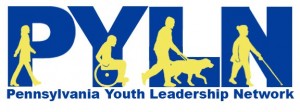 Teens are powerfully influenced by their peers. That’s one reason why the Pennsylvania Youth Leadership Network (PYLN) has such an impact on the lives of teens with disabilities.
Teens are powerfully influenced by their peers. That’s one reason why the Pennsylvania Youth Leadership Network (PYLN) has such an impact on the lives of teens with disabilities.
PYLN is a group of fabulous young leaders with disabilities from across Pennsylvania. Their mission is “to develop the self determination, empowerment and leadership of youth - so they can attain successful outcomes in the areas of education, employment, independent living, health and wellness.”
PYLN members range in age from 16 to 28. They have a wide range of gifts and disabilities - and a shared passion to empower their peers.
Check out PYLN’s YouTube channel here.
PYLN members facilitate dynamic interactive sessions with their peers throughout Pennsylvania. But no matter where you live, you and your child can benefit from their toolkits.
With the support of adult allies from advocacy organizations and the PA Departments of Education and Health - PYLN members have developed two toolkits that are a wonderful resource for young people with disabilities and their families.
Both toolkits feature pictures of and stories by PYLN members. Engaging activities developed by youth for youth are also included.
Transition Toolkit
This toolkit engages youth in getting to know themselves well, setting goals, and taking action for their own future. The toolkit includes three sections:
- Phase One - Accept Yourself
- Phase Two - Declare Yourself
- Phase Three - Empower yourself
Download the PYLN Transition Toolkit in pdf format here: PYLN2ndTransitionToolkit
Health and Wellness Toolkit
This toolkit engages youth in considering and planning for their own physical and mental health and wellness. Sections include:
- Relationships
- Individual Interests and Community Life
- Balance
- Diet and Exercise
- Healthy Practices
Download the PYLN Health and Wellness Toolkit in pdf format here: PYLNHealthcareToolkit
Using the Toolkits
Toolkit activities may need to be adapted to meet your child’s needs. Or - your child may have the skills to use the toolkits independently. But it’s not reasonable to simply give kids the toolkit and expect them to navigate it on their own. Most kids will enjoy and benefit from the activities when they experience them with someone they admire and trust.
Surely our kids trust us. But let’s be honest. Even though our kids have disabilities - they have the same developmental tasks as other adolescents. They need to “separate and individuate” from us - their parents. It’s important for our kids to have other adults and positive peer role models involved in their lives.
It is ideal for kids to engage in toolkit activities with a special person - a mentor. This person must be someone you know well and trust completely. Someone who can support your child in thinking about their preferences and their future.
So - who might this person be?
An aunt, uncle, older cousin? The parent of another child? Someone from church, a neighbor, a family friend?
You may also want to check in with local advocacy organizations or your child’s teacher to see if a small self determination group can be started - involving several teens with disabilities and a teacher or mentor who can support them as they engage in toolkit activities.
What are your thoughts?


